Oct 21, 2019 - Dr. Joan Waugh, Professor of History at UCLA, lectured twice on Ulysses S. Grant as the 2019 Carls-Schwerdfeger History Lecturer on October 21. Waugh teaches courses on nineteenth-century American history, and her research and writing focus on the Civil War, Reconstruction, and the Gilded Age.
In her afternoon lecture, Waugh talked about “Ulysses S. Grant and the Nature of Surrender during the Civil War” before an audience of 140 people. Waugh used the Confederate surrenders to the Union forces under Grant at Fort Donelson in 1862, at Vicksburg in 1863, and at Appomattox in 1865 as the basis for her lecture. She stated that Grant was relentless in his pursuit of military victory on all three occasions but showed magnanimity toward the enemy once victory had been achieved. While Grant’s immediate response to the Confederates’ requests for terms at both Fort Donelson and Vicksburg was unconditional surrender, in each instance he quickly softened his position. At Fort Donelson, Grant dispensed with any formal surrender ceremony, stating that there was no need to “mortify and injure the spirit of brave men who are, after all, our own countrymen.” In the negotiations for the South’s surrender at Vicksburg, Grant shifted from a demand for unconditional surrender to a grant of parole to the defeated Confederate soldiers. When Grant met with Robert E. Lee, commander of the Confederacy’s Army of Northern Virginia, at Appomattox in April 1865 to discuss the terms of the South’s surrender, he again demonstrated conciliation in what he demanded. Waugh asserted that the key sentence in the surrender document was the last one, which declared: “Each officer and man will be allowed to return to their homes, not to be disturbed by United States Authority so long as they observe their parole and the laws in force where they may reside.” This provision guaranteed a secure future for all Rebel soldiers from the lowest to highest in rank. While Grant exceeded his instructions from President Abraham Lincoln at Appomattox by intruding into the realm of political reconstruction through his offer of peace and reconciliation to the South, Waugh indicated that it “was rendered so perfectly that no complaint was lodged by the president.” Waugh concluded that throughout the cruelties of the war, Grant “never forgot the ultimate goal of restoring a peaceful union. Simply put, the surrender [at Appomattox] reigns as one of the supremely perfect moments of our national history.”
Waugh delivered her evening lecture, titled “Ulysses S. Grant: Soldier-Statesman,” to a crowd of 550 people. She announced in her introduction that she would deal with the memory wars regarding Grant’s place in American history from the time of his military leadership in the Civil War and ensuing presidency to the present. For millions of people of his time, he was an admired and popular individual who was decisive in winning the war as a Union general and in keeping the country together as president. Waugh stated, “At his death, he was the most famous of Americans at home and abroad.” The considerable popularity he enjoyed during his military and political careers rapidly faded following his death, owing largely to a version of history known as “The Lost Cause.” This interpretation argued that the Confederate armies were never defeated but were overwhelmed by numbers and that Grant was a man of questionable military ability and inferior intelligence. Many groups in the South propagated this version, including historians who turned people’s attention from the Union’s military victory in the Civil War to a glorification of the South’s loss. Soon history textbooks in both the north and south depicted Grant as a brutal general in the Civil War and a military dictator as president whose Reconstruction policy was excessively harsh toward the former Confederacy and whose administration was corrupt. That view held firm for many decades. Since the 1990s, however, revisionist historians, including Waugh, have put forward much more positive assessments of Grant. Recent scholarship has highlighted his achievements as a civil rights president who acted forcefully on behalf of African Americans in the midst of intensely racist forces throughout the country. Revisionist historians have also cast President Grant in the mold of Abraham Lincoln, portraying him as an ardent nationalist and reconciliationist who, believing that the Union was worth preserving, used the power of the federal government to achieve that. As a result of the new scholarship, his reputation has trended upward in the past generation. Waugh also said that the best way to evaluate him was to view his military and political careers as an integrated whole, i.e., as a soldier-statesman, since there were important continuities between his wartime ideas as general and his peacetime policies as president.
In addition to her lectures, Waugh met with history department members over coffee and attended a dinner in her honor in Union’s Chapman Dining Room. She also visited Shiloh National Military Park and Grant’s Battle of Shiloh headquarters – the Cherry Mansion – in Savannah, Tennessee.
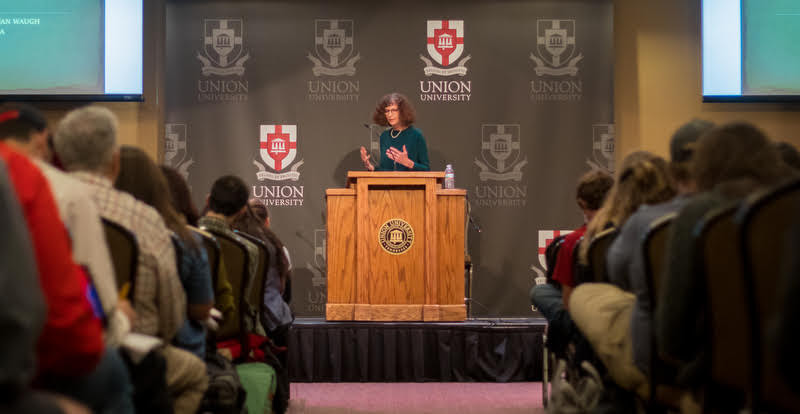 Dr. Joan Waugh of UCLA lectures on "Ulysses S. Grant and the Nature of Surrender During the Civil War" on October 21, 2019, to some 140 people at Union University. Photo by Nikki Grimm
Dr. Joan Waugh of UCLA lectures on "Ulysses S. Grant and the Nature of Surrender During the Civil War" on October 21, 2019, to some 140 people at Union University. Photo by Nikki Grimm
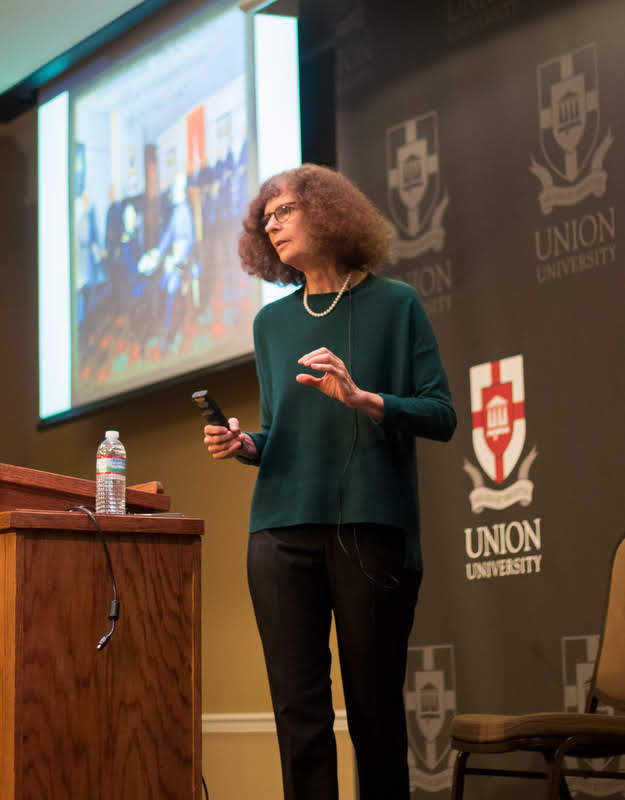 Professor Joan Waugh of UCLA lectures about "Ulysses S. Grant and the Nature of Surrender During the Civil War" on the afternoon of October 21, 2019.
Professor Joan Waugh of UCLA lectures about "Ulysses S. Grant and the Nature of Surrender During the Civil War" on the afternoon of October 21, 2019.
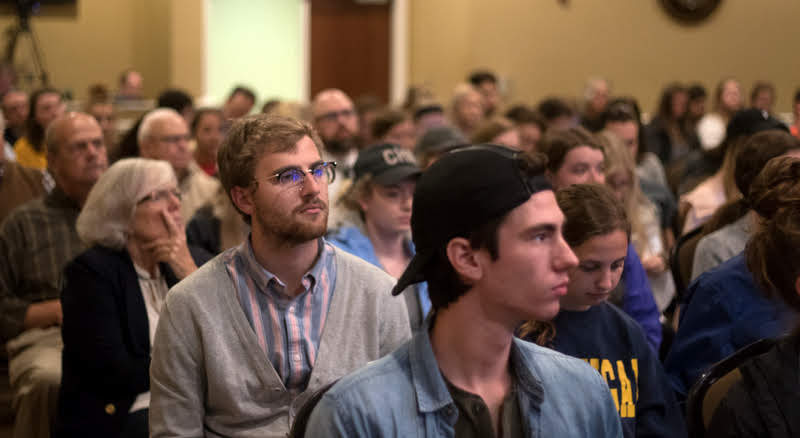 A crowd of 140 people listens to Dr. Joan Waugh speak about "Ulysses S. Grant and the Nature of Surrender During World War I" on the afternoon of October 21, 2019.
A crowd of 140 people listens to Dr. Joan Waugh speak about "Ulysses S. Grant and the Nature of Surrender During World War I" on the afternoon of October 21, 2019.
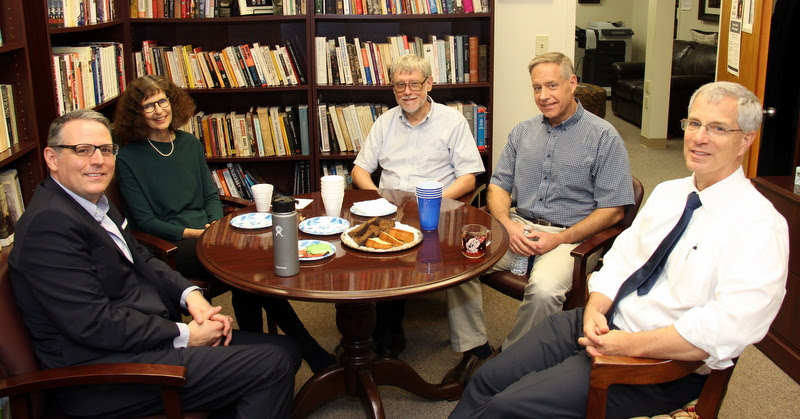 Dr. Joan Waugh of UCLA has coffee and pastries with history department members on the afternoon of October 21, 2019. Department members in the photo are (left to right) Drs. Keith Bates, Terry Lindley, Henry Allen, and David Thomas.
Dr. Joan Waugh of UCLA has coffee and pastries with history department members on the afternoon of October 21, 2019. Department members in the photo are (left to right) Drs. Keith Bates, Terry Lindley, Henry Allen, and David Thomas.
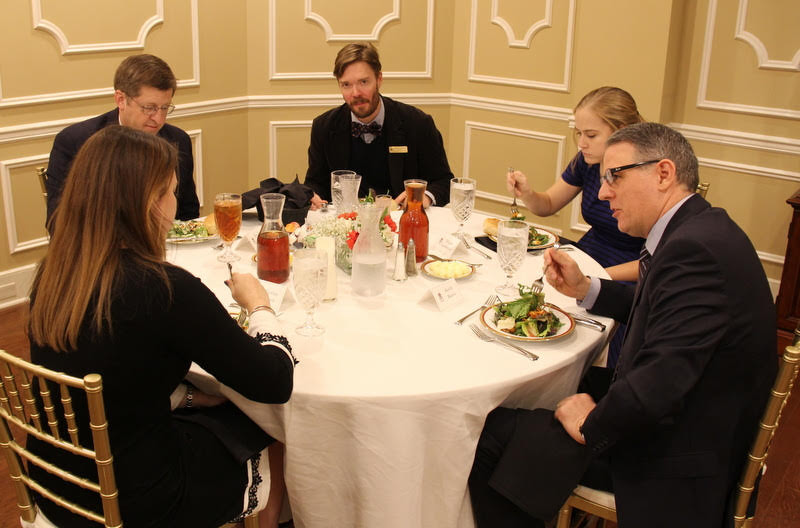 Attendees at the dinner in honor of Dr. Joan Waugh of UCLA enjoy good food and conversation together. They are (starting at the left front and going clockwise) Caitlin Roach (Marketing Director of the Jackson Symphony Orchestra), Dr. Ray Van Neste (Dean of the School of Theology and Missions), Dr. Jason Strandquist (Chair of the Social Studies Department at the University School of Jackson), Megan Ledbetter (Vice President of the Delta-Psi chapter of Phi Alpha Theta), and Dr. Keith Bates (Professor of History at Union).
Attendees at the dinner in honor of Dr. Joan Waugh of UCLA enjoy good food and conversation together. They are (starting at the left front and going clockwise) Caitlin Roach (Marketing Director of the Jackson Symphony Orchestra), Dr. Ray Van Neste (Dean of the School of Theology and Missions), Dr. Jason Strandquist (Chair of the Social Studies Department at the University School of Jackson), Megan Ledbetter (Vice President of the Delta-Psi chapter of Phi Alpha Theta), and Dr. Keith Bates (Professor of History at Union).
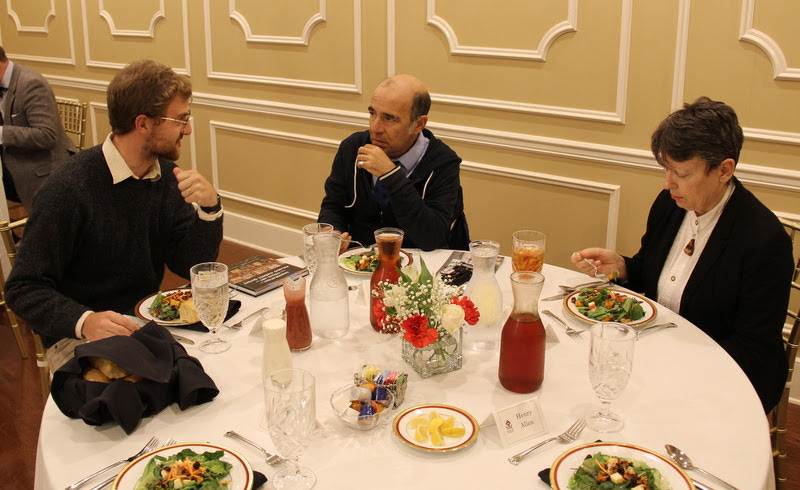 Luke Sower (left) talks to Dr. Michael La Rosa of Rhodes College about Latin American history at the dinner in honor of Dr. Joan Waugh of UCLA on October 21, 2019. Dr. Alice-Catherine Carls is at the right.
Luke Sower (left) talks to Dr. Michael La Rosa of Rhodes College about Latin American history at the dinner in honor of Dr. Joan Waugh of UCLA on October 21, 2019. Dr. Alice-Catherine Carls is at the right.
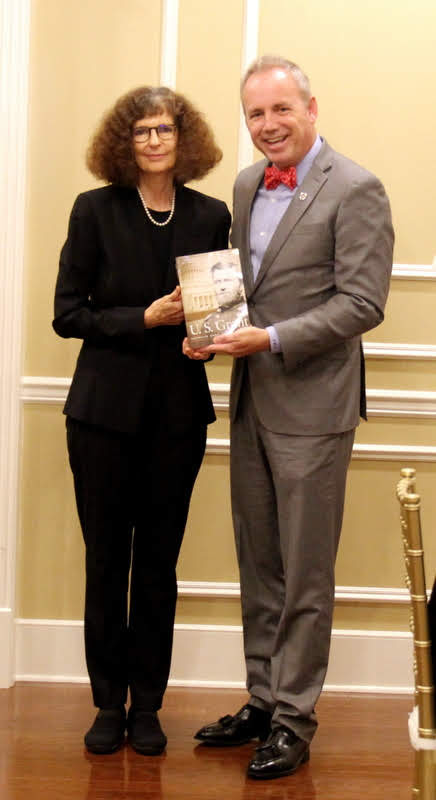 Professor Joan Waugh of UCLA gives a copy of her book U. S. GRANT: AMERICAN HERO, AMERICAN MYTH to Union University President Dr. Samuel W. "Dub" Oliver at a dinner in her honor on October 21, 2019.
Professor Joan Waugh of UCLA gives a copy of her book U. S. GRANT: AMERICAN HERO, AMERICAN MYTH to Union University President Dr. Samuel W. "Dub" Oliver at a dinner in her honor on October 21, 2019.
 Dr. Stephen Carls presents a book on the history of Union University to Dr. Joan Waugh at a dinner in her honor on October 21, 2019.
Dr. Stephen Carls presents a book on the history of Union University to Dr. Joan Waugh at a dinner in her honor on October 21, 2019.
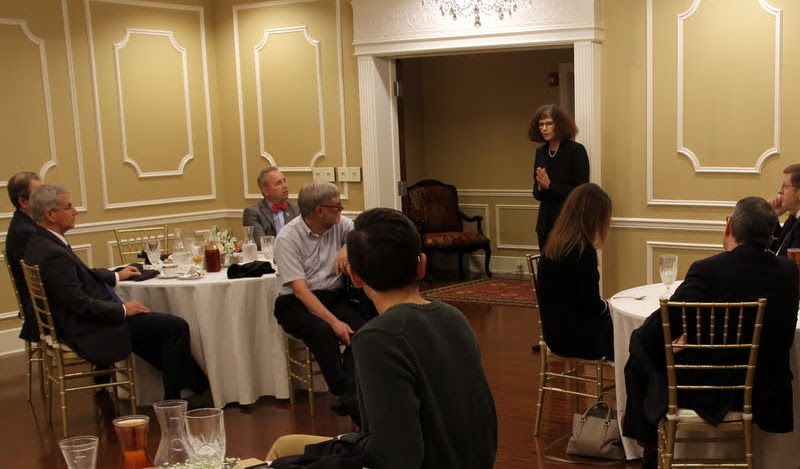 Professor Joan Waugh responds to a question during a question and answer time at a dinner in her honor on October 21, 2019.
Professor Joan Waugh responds to a question during a question and answer time at a dinner in her honor on October 21, 2019.
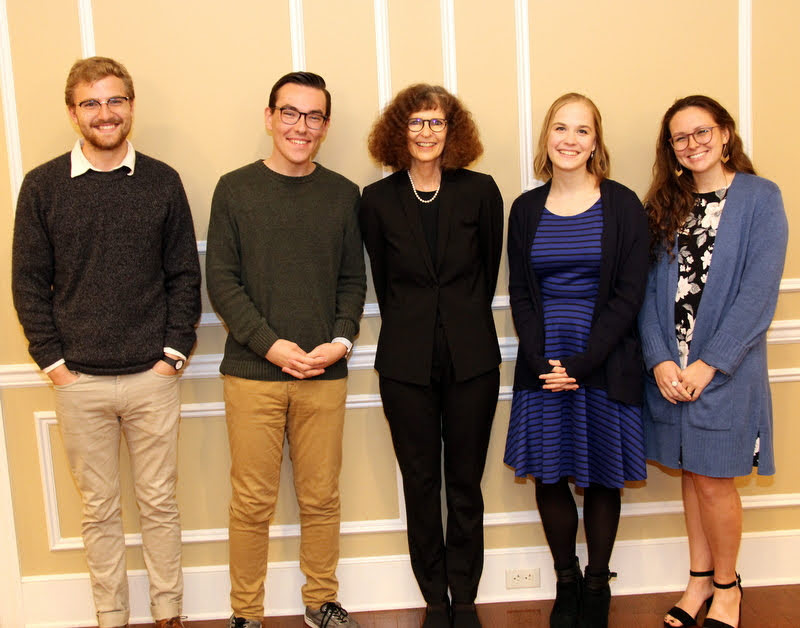 Dr. Joan Waugh (center) stands with Phi Alpha Theta officers at the end of a dinner in her honor on October 21, 2019. The officers are (left to right) Luke Sower (president), Mac Hazlerig (SGA senator), Megan Ledbetter (vice president), and Katie Allison (SGA senator).
Dr. Joan Waugh (center) stands with Phi Alpha Theta officers at the end of a dinner in her honor on October 21, 2019. The officers are (left to right) Luke Sower (president), Mac Hazlerig (SGA senator), Megan Ledbetter (vice president), and Katie Allison (SGA senator).
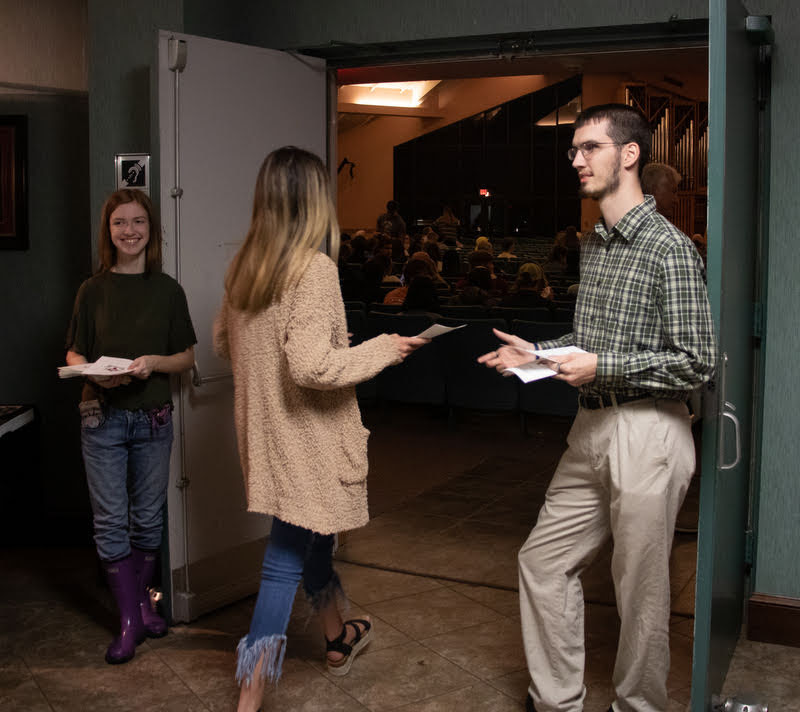 Savannah Wright (left) and Matthew Latham (right) distribute programs to attendees at the evening lecture of the 2019 Carls-Schwerdfeger History Lectureship with Dr. Joan Waugh on October 21. Photo by Joey Echeverria
Savannah Wright (left) and Matthew Latham (right) distribute programs to attendees at the evening lecture of the 2019 Carls-Schwerdfeger History Lectureship with Dr. Joan Waugh on October 21. Photo by Joey Echeverria
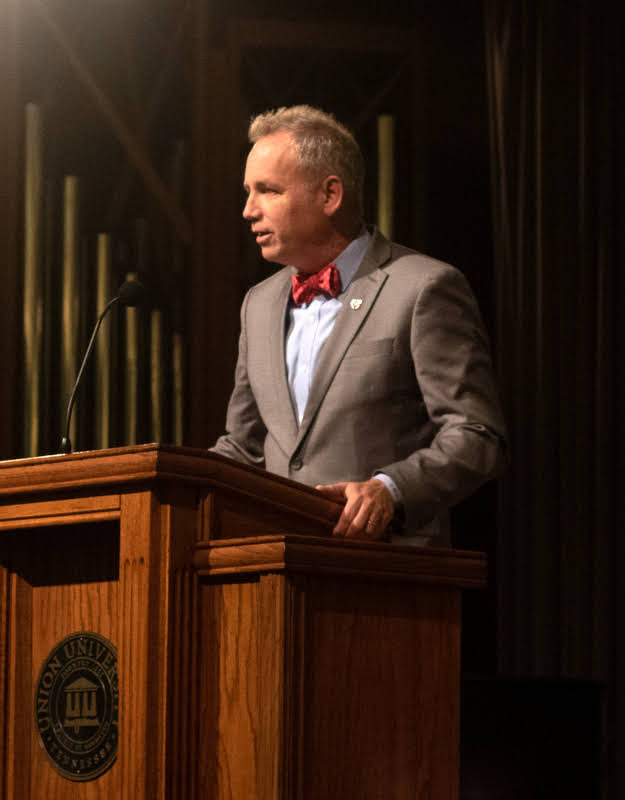 Union University President Dr. Samuel W. "Dub" Oliver welcomes attendees to the evening lecture of the Carls-Schwerdfeger History Lectureship with Professor Joan Waugh on October 21, 2019. Photo by Joey Echeverria
Union University President Dr. Samuel W. "Dub" Oliver welcomes attendees to the evening lecture of the Carls-Schwerdfeger History Lectureship with Professor Joan Waugh on October 21, 2019. Photo by Joey Echeverria
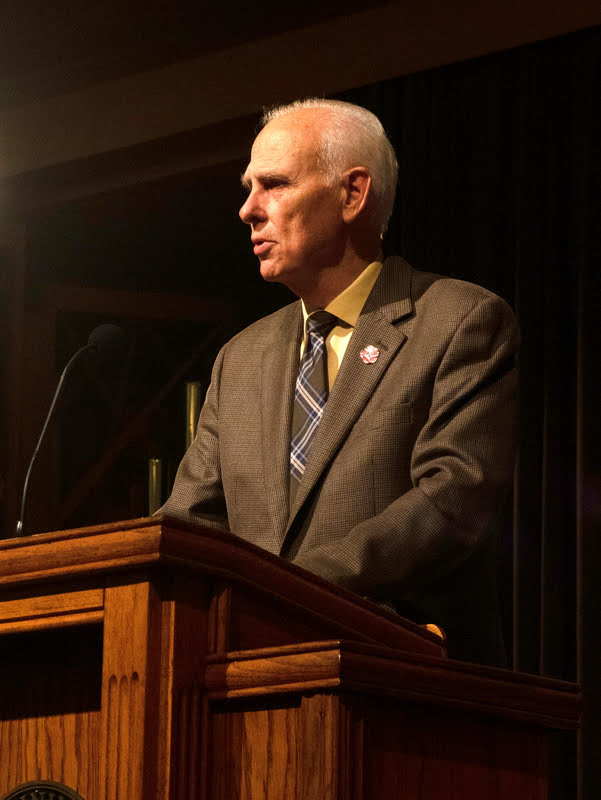 Dr. Stephen Carls introduces Dr. Joan Waugh at the evening lecture of the Carls-Schwerdfeger Lectureship on October 21, 2019. Photo by Joey Echeverria
Dr. Stephen Carls introduces Dr. Joan Waugh at the evening lecture of the Carls-Schwerdfeger Lectureship on October 21, 2019. Photo by Joey Echeverria
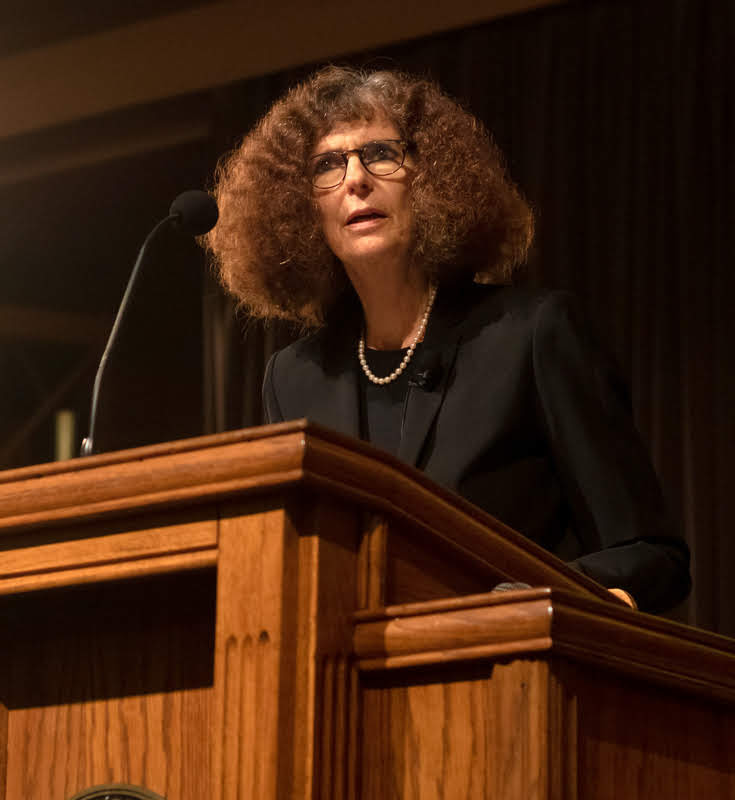 Joan Waugh of UCLA lectures on "Ulysses S. Grant: Soldier-Statesman" at Union University on the evening of October 21, 2019. Photo by Joey Echeverria
Joan Waugh of UCLA lectures on "Ulysses S. Grant: Soldier-Statesman" at Union University on the evening of October 21, 2019. Photo by Joey Echeverria
 An audience of 550 people listen to Professor Joan Waugh of UCLA lecture on "Ulysses S. Grant: Soldier-Statesman" in Union's G. M. Savage Memorial Chapel on October 21, 2019. Photo by Joey Echeverria
An audience of 550 people listen to Professor Joan Waugh of UCLA lecture on "Ulysses S. Grant: Soldier-Statesman" in Union's G. M. Savage Memorial Chapel on October 21, 2019. Photo by Joey Echeverria
